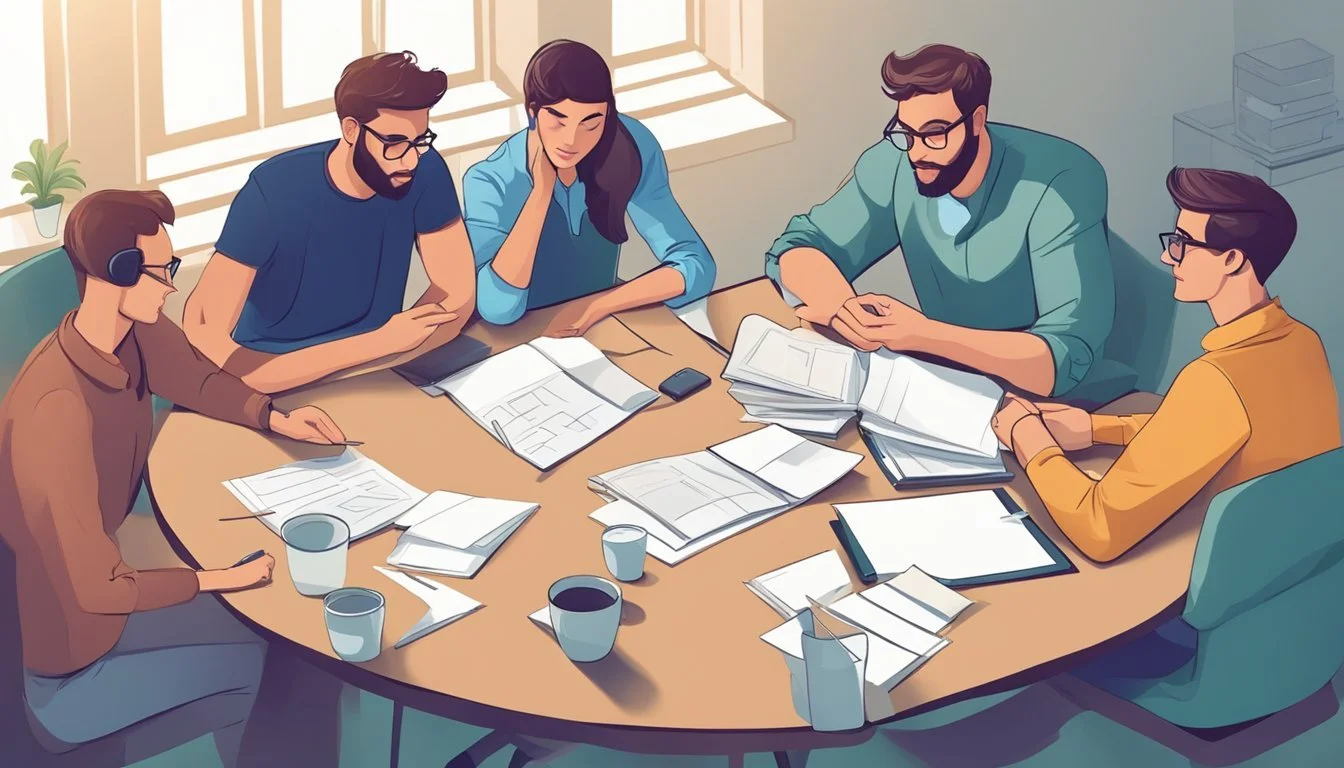11 Reasons Why Having a Friend Who's a Great Problem Solver is a Lifesaver
Support and Solutions
Navigating life's challenges becomes significantly easier with a friend who excels at problem-solving. They bring a unique set of skills that can turn complicated situations into manageable tasks. Problem-solving friends not only offer practical solutions but also provide emotional stability during tough times.
Having a friend who is adept at solving problems is invaluable in both personal and professional environments. Their ability to remain calm under pressure and think logically can prevent small issues from escalating. These friends often possess traits such as humility, collaboration, and critical thinking, making them reliable companions in times of need.
Not only do they help in resolving immediate problems, but they also teach valuable problem-solving techniques. Their approach to handling crises can inspire those around them to adopt similar strategies, fostering a more resilient and resourceful community.
1) They Provide New Perspectives
A friend who excels at problem-solving can offer fresh viewpoints that might not have been considered otherwise. This ability to see situations differently is crucial when feeling stuck.
They bring their own experiences and insights, which can shed light on alternative solutions. This can be particularly useful in challenging circumstances where conventional thinking fails.
Having someone who can provide diverse perspectives ensures that problems are approached from multiple angles. This often leads to innovative solutions.
By discussing issues with them, one can benefit from their objective outlook. They can pinpoint potential pitfalls and advantages that might be overlooked. This external perspective is invaluable in making informed decisions.
Discussing problems with a friend can also help identify underlying issues. Their ability to see things from a different angle can reveal root causes that might not have been apparent.
Friends who are adept at problem-solving can also help recalibrate thinking patterns. Their different outlooks can challenge existing assumptions and broaden one’s understanding of the problem at hand.
Moreover, they can demonstrate how to approach problems creatively. Seeing their problem-solving strategies in action can inspire similar methods in one’s own life.
For more information about the importance of new perspectives, you can visit Psychology Today.
2) Always Stays Calm Under Pressure
Having a friend who remains calm in stressful situations is invaluable. Their ability to maintain composure can help diffuse tense moments and keep everyone focused on finding solutions. Calmness under pressure often means they think more clearly and make better decisions.
People who stay calm typically have an even-tempered nature. They do not let emotions cloud their judgment, allowing them to respond thoughtfully instead of reacting impulsively. This trait is crucial in high-stakes situations where quick, rational thinking is essential.
A strong sense of purpose often anchors their calm demeanor. Knowing what truly matters helps them navigate pressure with grace and resilience. Their confidence and self-assuredness make them reliable in crises.
Regular practices like mindfulness or gratitude can also play a role in their calmness. Daily habits that foster mental clarity and emotional stability make them better prepared to handle stress. This reliability makes their presence a comforting influence.
Moreover, they embrace pressure instead of resisting it. By viewing pressure as a natural part of life, they are less likely to be overwhelmed. This perspective helps them stay grounded and better equipped to tackle problems as they arise.
3) Quickly Identifies the Root Cause
A friend with strong problem-solving skills excels at quickly pinpointing the root cause of an issue. This capability is essential for addressing problems effectively and efficiently.
Using proven techniques like the "But Why?" method helps them dig deeper beyond surface symptoms. A clear understanding of the fundamental issue allows them to find appropriate solutions.
They often employ tools such as the 5-Why analysis, which involves asking "Why?" multiple times. This technique systematically unravels complex problems, revealing underlying causes that might otherwise be overlooked.
Their ability to define and map problem causes, like described in the root cause analysis approach, is invaluable. They gather and analyze relevant data to create a thorough action plan. This analytical mindset ensures that solutions address the real issue rather than merely treating symptoms.
Overall, a friend skilled in root cause analysis saves time and resources by steering efforts towards the heart of the problem.
4) Offers Practical Advice
A friend who excels at problem-solving can offer practical advice grounded in reality. They understand that when you're facing a difficult situation, actionable steps are more helpful than vague suggestions. This makes their advice both relevant and effective.
Instead of telling you what you want to hear, they provide honest feedback which helps in making informed decisions. Their recommendations are often based on personal experiences or well-thought-out reasoning.
When you need advice on career choices, relationships, or daily life issues, a friend with problem-solving skills can present solutions that are not only practical but also achievable. Their ability to break down complex problems into simpler, manageable parts ensures that you can tackle challenges with confidence.
This practicality extends to emotional support as well. They are not just there to listen but also to help you find reasonable ways to cope with emotional stress. They recognize that while empathy is important, providing concrete steps to alleviate pain or discomfort is equally vital.
By offering practical advice, these friends empower you to navigate life's hurdles more effectively. Whether it's through strategic planning or offering a fresh perspective, their input is invaluable in guiding you through dilemmas. Their practical nature helps minimize uncertainty and maximizes clarity, making them an invaluable support system.
5) Can Foresee Potential Challenges
A friend who excels in problem-solving often has the ability to foresee potential challenges before they arise. This anticipation can be invaluable in both personal and professional scenarios.
By identifying obstacles early, they can guide decisions that mitigate risks. Their insight helps in developing strategies that avoid common pitfalls, ensuring smoother progress in various endeavors.
They often exhibit a keen awareness of patterns and outcomes based on past experiences. This predictive ability allows them to prepare solutions for issues that might otherwise catch others off guard.
Such friends are adept at analyzing situations from multiple angles. This skill aids in uncovering hidden complications that may not be immediately obvious, allowing proactive measures to be put in place.
In group settings, their foresight contributes to overall success by preventing potential problems before they can escalate. Their role becomes crucial in maintaining stability and achieving collective goals.
6) Helps Break Down Complex Issues
A friend who excels at problem-solving can help dismantle complex issues into manageable parts. This ability to break down intricate problems makes tackling each component less daunting.
By dividing a problem into smaller sections, they make it more approachable.
This method enables them to identify the root causes and address them systematically. It also reduces stress and increases efficiency.
They know how to navigate challenges and simplify processes, making it easier to find solutions. This structured approach ensures that no detail is overlooked.
Breaking down complex issues helps in developing a clear action plan. It allows for a step-by-step progression toward solving the problem efficiently.
Their structured thinking provides clarity and focus in otherwise overwhelming situations. This skill is invaluable in both personal and professional contexts.
They use this technique to transform seemingly insurmountable issues into achievable tasks. This makes progress more tangible and measurable, maintaining momentum.
A friend with this talent enables you to stay calm and composed. Their methodical approach fosters confidence and ensures continuous improvement.
Learning from their approach can improve your own problem-solving skills. This enhances your ability to tackle future issues with greater ease.
7) Uses creative problem-solving techniques
A friend who excels in problem-solving often leverages creative approaches to find solutions. These techniques can be particularly useful when conventional methods fall short.
One effective technique is mind mapping. This involves visually organizing information to uncover new connections and ideas, helping to see the problem from multiple angles.
Another approach is role-playing. By assuming different personas, they can brainstorm potential solutions from each perspective. This can lead to out-of-the-box thinking that might not emerge in a typical discussion.
Creative problem-solvers also adapt quickly to change. They use innovation to navigate complex situations, making them invaluable in dynamic environments.
Lastly, encouraging input from diverse sources can lead to unique solutions. Their openness to different viewpoints fosters innovative thinking.
These techniques make a friend who embraces creative problem-solving a key asset in tackling life's challenges.
8) Keeps Team Morale High
A friend who's a great problem solver can significantly boost team morale. They provide clear guidance, which ensures everyone understands the direction and goals. This clarity reduces frustration and promotes a sense of purpose.
Regular one-on-one check-ins are another way they maintain high morale. By addressing individual workloads and career goals, they help team members feel valued and understood.
This friend also confronts frustrations head-on. Addressing issues directly prevents small problems from escalating, ensuring a positive and productive work environment. Promoting transparent communication further strengthens trust within the team.
They create a culture of recognition and reward. Small acknowledgments of effort can go a long way in motivating team members to strive for excellence. Positive reinforcement encourages a continuous loop of high performance and satisfaction.
Adaptability is another key trait. Quick and effective solutions to unexpected challenges help maintain stability and confidence within the team. This reduces stress and keeps the team moving forward without significant disruptions.
Encouraging collaboration fosters a supportive environment. When team members work together to solve problems, it builds camaraderie and shared success. This sense of teamwork enhances both morale and productivity.
9) Provides Clear and Logical Solutions
Having a friend who excels at problem-solving is invaluable. They approach issues systematically, dissecting them to understand the root cause. This method ensures that the solutions they propose are not just quick fixes, but effective and sustainable.
Smart people often have fewer friends, focusing on quality relationships where their skills can be utilized best. According to a study from the British Journal of Psychology, intelligent individuals prefer small, close-knit social circles.
Logical thinking partners are crucial, as shown by some of the greatest minds in history. Collaborating with these friends often leads to innovative and practical solutions, as observed in insights shared by psychologists.
Additionally, when facing complex problems, having someone who can offer clear, logical advice can save time and reduce stress. They help in weighing the pros and cons, ensuring that decisions made are well-considered and impactful.
10) Mediates conflicts effectively
A friend who excels in mediation can make a significant difference during conflicts. They approach disputes with a calm demeanor, helping involved parties articulate their points without escalating tension.
This friend employs active listening, ensuring everyone feels heard and understood. By validating each person's feelings, they foster a collaborative atmosphere.
Understanding the nuances of each party's perspective, they offer fair solutions that consider everyone's needs. This ability to mediate ensures conflicts are resolved constructively, maintaining harmony in relationships. For more details, consider reading about managing conflicts at Psychology Today.
Their skill in timing also plays a crucial role. They know when to address issues and when it's best to hold off until emotions are less intense. Thoughtful timing prevents conflicts from worsening and allows for more rational discussions.
Having such a friend can dramatically reduce stress during disagreements. Their expertise turns potential arguments into opportunities for growth and understanding. By mediating effectively, they ensure conflicts don't damage relationships but instead strengthen them.
11) Has a wealth of knowledge and resources
A friend who excels at problem-solving often possesses an extensive repository of knowledge and resources. They might be well-read, stay updated with current events, or have undertaken specialized training or education.
Their vast experience allows them to provide informed advice and insights. This can be invaluable when facing complex issues that require more than just common sense or intuition.
Such a friend can also connect you with other experts or useful tools. Whether it's recommending a good therapist or directing you to a helpful website, their network can be incredibly supportive.
Their access to these resources means they're equipped to handle varied challenges. From financial dilemmas to emotional crises, they can draw on their knowledge base to offer practical solutions.
This wealth of information helps them anticipate potential problems and plan accordingly. Their proactive approach reduces risks and increases the likelihood of successful outcomes.
Understanding where to find the right information is a critical skill. A knowledgeable friend often knows the best sources for accurate and reliable information, helping you avoid misinformation.
Trusting their guidance can save time and reduce stress. Instead of wading through a sea of information, you can rely on their expertise to navigate directly to what’s necessary.
Understanding Problem Solving
Problem solving is an essential skill in daily life. It involves identifying, analyzing, and finding effective solutions to various issues. This section will explain what problem solving entails and the different types of problems people encounter.
What Is Problem Solving?
Problem solving is the process of working through details of an issue to reach a solution. It begins with recognizing a problem, followed by understanding it, brainstorming potential solutions, and finally implementing the best option.
Effective problem solvers use a combination of creativity, analytical skills, and critical thinking. They often engage others in the process to gather diverse perspectives and ideas. For instance, natural problem solvers are humble and open to feedback, which helps in crafting well-rounded solutions.
Types of Problems
Problems can be classified into various types, each requiring different approaches.
Simple Problems: These are straightforward and have clear solutions. Examples include daily tasks like fixing a leaky faucet or finding lost items.
Complex Problems: These involve multiple variables and require a more sophisticated approach. Complex problems often need thorough analysis and strategic planning, such as creating a marketing strategy or developing a new product.
Wicked Problems: These are highly complicated with no clear solution. Issues like climate change or social inequality fall into this category. Solving wicked problems often involves continuous learning and adaptation.
Sticky Situations: Interpersonal conflicts or sensitive matters, like dealing with a friend's difficult partner, are also a type of problem that demands empathy and tactful handling.
Qualities of a Great Problem Solver
Great problem solvers possess a unique blend of skills and qualities that enable them to approach issues systematically. They excel in analytical thinking, creativity in solutions, and effective communication.
Analytical Thinking
Analytical thinking is the cornerstone of problem-solving. Great problem solvers have the ability to break down complex problems into manageable parts. They identify the underlying causes and evaluate each component critically.
This ability involves data analysis, pattern recognition, and logical reasoning. For instance, they can interpret statistical information to make informed decisions. An example is identifying trends and anomalies that point to the root cause of issues, thus preventing potential problems before they escalate. Furthermore, their systematic approach ensures that each aspect of the problem is thoroughly examined.
Creativity in Solutions
Creativity sets exceptional problem solvers apart. They think beyond conventional methods, envisioning unique and innovative solutions. This involves not being confined to one's conditioning and exploring novel possibilities.
Natural problem solvers demonstrate flexibility and original thinking. They are open to experimenting with unconventional ideas and are not afraid to take calculated risks. For example, during a crisis, they might devise an unorthodox strategy that addresses both immediate needs and long-term consequences. This creative aspect ensures that solutions are not only effective but also efficient.
Effective Communication
Effective communication is essential for translating complex problems and solutions into understandable terms. Great problem solvers articulate issues clearly, making it easier for others to grasp the situation.
They excel in both verbal and written communication. By engaging others and sharing insights, they facilitate collaboration and gather diverse perspectives. For example, they might present data through compelling visuals or explain technical details in simple language. This ability ensures that everyone involved understands their role and the plan of action, leading to smoother implementation and greater success in resolving issues.
These qualities highlight the distinct strengths that make a great problem solver invaluable in any situation, enhancing both personal and professional environments.







